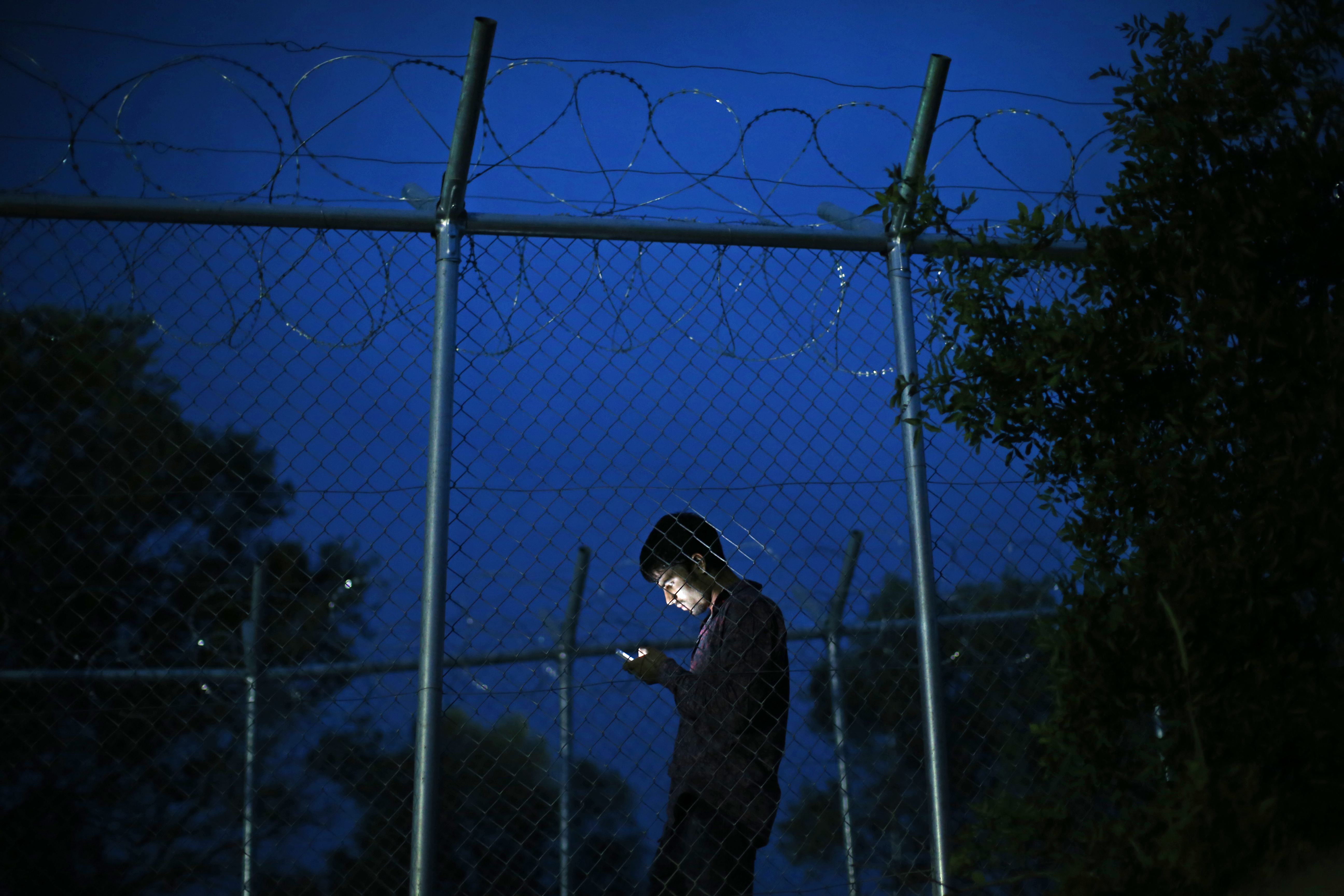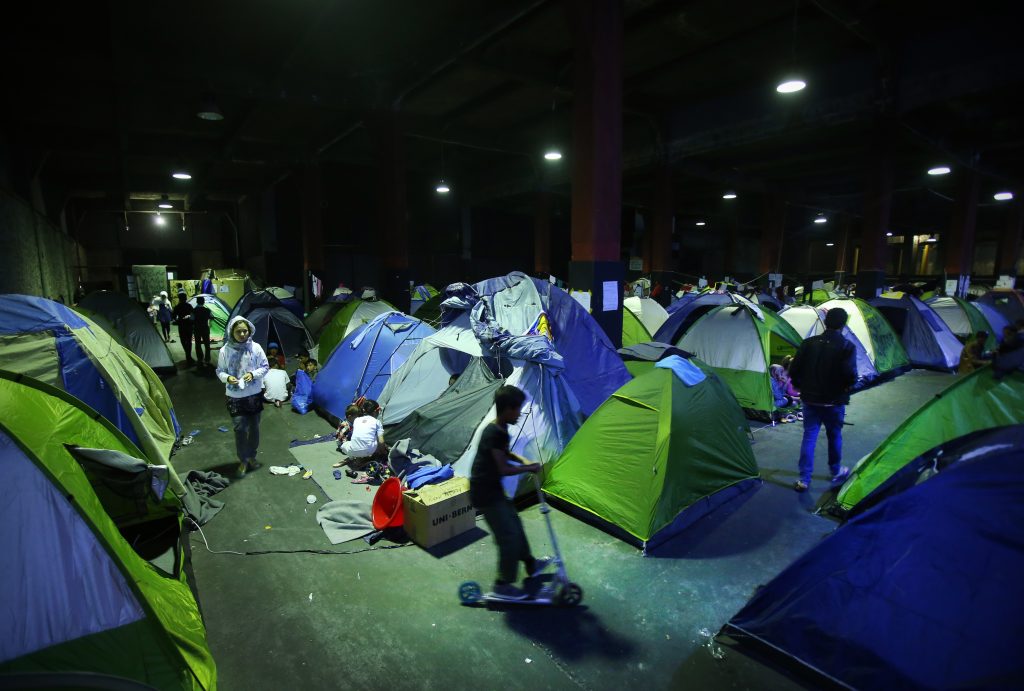This is not a refugee “hotspot”. It’s a prison!
By Boštjan Videmšek, DELO
Following the EU-Turkey deal, refugees in Greece are being held in so-called “hotspots”, which are actually prisons, and many are now on hunger strike.

Thursday 5 May 2016
Following the closing of the Balkan refugee route and the sealing of the deal between the European Union and Turkey, some 55,000 refugees and migrants remain trapped in Greece. Many of them are being kept inside detention centres, where the living conditions are well beyond disastrous.
The worst of it can be observed on the Aegean island of Chios. On the island, the EU directed the Greek authorities – who had little say in the matter – to seal the fate of tens of thousands of refugees by opening up the VIAL hotspot, where around a thousand people are currently awaiting their fate.
All of them have arrived in Greece since 20 March 2016, when the deal between Brussels and Ankara entered into force. The ruthless bargain prevented the refugees and migrants from pressing on further into Europe, instead cramming them into a number of what are effectively jails.
These institutions are located both on the Greek mainland and on its islands. But the so-called VIAL “hotspot”, which is actually a prison, was soon to attain a special notoriety for becoming the metaphor for the xenophobic and racist European (anti-)refugee and (anti-)migrant policies. The strategists in Brussels had decided to turn the already politically, socially and economically ransacked country of Greece into a sort of human wastebin, thereby exacerbating the suffering of tens of thousands of people.

In these times of spreading hatred, racism and growing neo-Nazi parties, it seems especially important to call things by their proper names. The “hotspot” I am currently reporting from is nothing less than the concentration camp of our day.
The camp – located a 20-minute drive away from the island's capital – presents the visitor with a frightening picture. The refugees and migrants I have been talking to all related stories and experiences that should make the whole of Europe shudder in shame. Yet the very capacity for shame seems to have been driven from the continent by a narcissistic self-obsession and a highly aggressive drive to keep oneself permanently within the comfort zone.
In the early evening, I got to talking to an Afghan girl named Geza who spoke perfect English. I met her next to a hole in the camp's fence. Many of the refugees were using the hole to get in and out of the camp, especially since the police presence was startlingly light on account of the holidays.
“We are being treated like garbage – as if we had the plague or something,” Geza told me: “We can no longer bear this. There are worms and caterpillars inside our food. There is not enough water, and a lot of what we get isn't even drinkable. There is not nearly enough medicine, and many of us have grown severely ill. The children have had the worst of it. Almost half of everyone here is underage. We have no idea what we've done to be treated this way. All we wanted was to live in peace.”
Geza told me she and her husband Farhan had fled both the Taliban and the Islamic State. “Please tell everyone what's happening to us here. This is a crime. We are all so hungry. And we are being humiliated. Me and my husband, we have been here for 40 days. Right after we arrived, we put in an application to be granted asylum. We were supposed to get a response 10 days ago, but nothing happened. No one in this camp was given a reply. And so we are waiting. We have no information to go on. We are cut off from the world. Both me and Farhan are very scared they will send us back to Afghanistan.”
This is a common, virtually universal fear among the residents of the VIAL detention centre. As recently as a week ago, the entire institution was hermetically sealed – until the exhausted and severely traumatised refugees decided to stage a protest. A certain threshold seemed to have been reached, and the local authorities made the tactical decision to permit their wards at least a modicum of free movement.
Yet the prison is located far from both the town and the port, which is why most people opted to search for food in the nearby villages, where all the shops were closed on account of Orthodox Easter. One enterprising local set up a vending stall right in front of the hotspot. The prices were about three times what one would pay in the town, yet the vast majority of the refugees and the migrants had already spent what money they had to get to Europe.
Most of them were also not at all eager to stray too far from the prison. One can hardly blame them for not feeling safe. The last few weeks saw a number of far-right groups attack both the refugees and the volunteers helping them. After 18 months of an open-door policy, the impoverished and economically ravaged island has finally refused to welcome the influx of fresh refugees. From what I could see, the islanders did this more to appease Brussels than from any genuine feelings of resentment or enmity. Be that as it may, the island which has been turned into a prison is one of the key images for envisioning our fast-approaching common European future.
“It is impossible to live here. There are as many as 20 of us inside a single container. During the day the whole place gets unbearably hot. I am sick to my stomach all the time – all the time,” I was told by a very dignified lady named Batul Rahim, standing at the front door of the modern concentration camp. “We have no privacy, we're hungry, and our children are exhausted. Most of them have no idea what is going on, and I think it is really better that way… I fled Mosul because of the Islamic State – they would have killed us for being Christians. All Christians were forced to escape, and a lot of them lost their lives.”
With a tearful break in her voice, Rahim told me she was a mother of a two-year old boy named Samuel and a three-year-old girl, Sonia, who were hiding behind her legs. “The world has forgotten about us. Some of our relatives managed to reach Germany and the Netherlands, while we have been thrown to rot in this jail.”
The grief-stricken woman also expressed her mortal fear that the European bureaucrats were about to send her back to hell. Had I decided to soothe her worries, I would have been forced to lie to her face. Virtually all the Syrians I encountered were telling stories of a devastated homeland and their bankrupt illusions about Europe.
Koda, a 57-year-old Iranian from Esfahan, told me he had arrived in Greece a mere four hours too late – on the very morning of 20 March when the bargain between the EU and Turkey raised the drawbridge, the bargain that seems certain to wreck hundreds of thousands of lives.
Ironically, the deal between the European Union and Turkey has been hailed as a great coup for European diplomacy, as if it has somehow solved the refugee question rather than exacerbated it. After the Balkan refugee route got closed and the Turkish authorities set about fulfilling their well-rewarded new array of tasks, the number of refugees and migrants reaching the Greek islands experienced a huge drop.
Most of those who had already been to Greece only to be thwarted by the closing down of the Macedonian-Greek border ended up in the so-called hotspots. At an improvised tent settlement in Idomeni, some 11,000 people are still waiting for the border to open. But they are waiting for a miracle that is simply not on the horizon – short of an actual miracle. Some 3,000 people are currently residing in the port of Piraeus, waiting for the holiday's end when the Greek authorities are set to cart them off to prisons. Precious few of them are likely to reach the desired goal of their journey – meaning Germany, the Netherlands or Sweden. They have made an investment of a lifetime in gathering both the gumption and the resources to flee the ravages of their war-torn lands only to be thrown in jail. And one thing is certain: they shall remain there for much longer than only a few weeks.
“Europe has her mouth full of human rights. If I remember correctly, your soldiers came to Afghanistan in the name of human rights as well, true? Well, I have come to Europe and I am certainly human. But where are my rights?” asked a 27-year-old Afghan named Hekmetulla Hakani, as he stood in front of the VIAL hotspot. “Me and my wife and my daughter have been trapped here for 40 days. My daughter is only 10-months-old. This is so horrible. I simply want to go home and die there.”
Hailing from the city of Helmand, Hakani had worked as a translator on NATO's ISAF mission, which earned him enough credible Taliban threats to force him to flee for his life. “They have imprisoned us here like terrorists. It is as if they don't think we're even human. We are suffering so hard, we have no idea what will happen to us. The policemen are telling us to simply wait – the ones that will even talk to us, that is, because most of them won't. A lot of the children here are seriously ill. And we have no money left. There is nowhere for us to go,” Hakani insisted.
“Why does it have to be this way? What have we done? Why does Europe hate us so much?” the former NATO translator asked in frustration and bewilderment.
Since my encouter with these inmates, the situation at the VIAL prison camp has gone from bad to worse. Today, Wednesday 4 May, many of the refugees went on hunger strike, with some going as far as to sew their lips together. “I'm going to kill myself. I will cut my throat with the razor-wire. I will bleed slowly. It won't hurt … I can't stand this any more. I'm sick. Everything hurts,” screamed Hamid, a distressed Palestinian-Syrian from Yarmouk camp who is now among the hunger strikers who have sewed their lips together. “We know what will happen to us. I can see my future it the eyes of the policemen. Or in the eyes of local people. They hate us. We are not people to them. I want to die.”
Something must be seriously wrong when someone who has risked their lives to escape death in the hopes of finding a safe refuge decides that life is not worth living anymore.
Extra police have been deployed to deal with the situation. But the answer does not lie in finding better ways to keep the inmates locked up, but to set them free. After all, these refugees have committed no crime, save to believe that Europe could provide them with a humane shelter from the hell they have fled.


Pingback: Newsletter on Greece & Aegean – Collection on relevant news: */Week #20/2016 – No Border Camp 2016